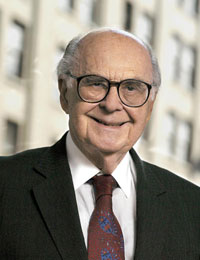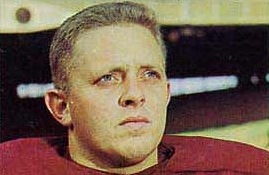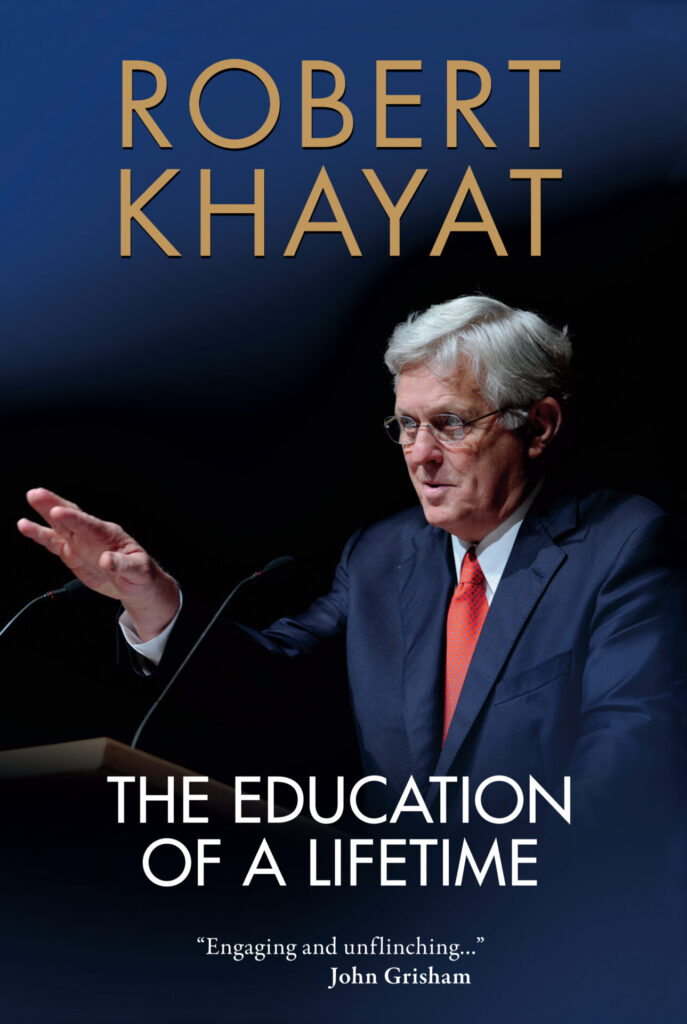Headlines
The Ole Miss Man for All Seasons

Harold Burson
By Harold Burson
There’s only one thing questionable about Robert Khayat writing an autobiography. He’s much too modest to give you the full measure of himself, no matter his meticulous accounting of a life well lived — for himself, his family and those fortunate to have been in his orbit.
With a funny-sounding (and even funnier spelling) name, Robert Khayat, of Lebanese descent, shows himself to be a Mississippian through and through, but even more so, one committed to the principles and ideals on which his land of the free and home of the brave was founded.
Born on Mississippi’s Gulf coast to a family of modest means and high moral and ethical values, young Khayat was on a winning track from the beginning, Both a competent student and, blessed with a sturdy physique, a good athlete. His specialty, encouraged at an early age by his father, was place-kicking a football. Recruited by such Southeastern Conference football giants as Alabama, and LSU, his heart was set on Ole Miss. It proved to be a good match.
Khayat’s years as an Ole Miss Rebel coincided with the glory days of Ole Miss football, the late 50s and into the 60s. As a defending linebacker and an offensive place kicker, Khayat’s first season on the varsity team resulted in a 9-1-1 season and 39-7 victory over Texas in the Sugar Bowl.

Robert Khayat in a Washington Redskins uniform
As a junior, the Rebels had a 9-2 record and beat Florida in the Gator Bowl. His senior year was even better: a 10-1 season, a Sugar Bowl victory over L.S.U. and ranked number one in the nation.
He proudly wrote: “Our teams were so dominant in the three-year stretch between 1957 and 1959 that we outscored our opponents 776 to 139.”
But he had his disappointments, the biggest when he failed to kick a 29-yard field goal when Tennessee was leading by two points at the tail end of a hard-fought game. His college performance led to four years in the National Football League, mainly with the Washington Redskins, but briefly with the Cleveland Browns. After an especially brutal game, he decided he no longer wanted the beating he took in every pro game and returned to the Ole Miss campus as a law student.
Attending law school was somewhat of an epiphany for him. He loved attending classes, he loved the law and what it stood for in a democratic society. But he makes clear he was not keen on practicing law and joined the law school faculty, gaining sufficient acclaim that his academic colleagues persuaded him to declare himself a candidate for the dean’s job when the incumbent dean resigned.

Chancellor Robert Khayat
In a formal poll, the law school faculty voted 14-7 that he was not acceptable as dean. He was devastated, left the law faculty and took on responsibility, under the then Chancellor Gerald Turner, to develop a program to celebrate the university’s 150th anniversary.
Almost from the time Khayat matriculated as a student, he believed the University could play a major role in elevating the status of the state of Mississippi educationally, financially and socially. He was especially upset that so many of the most accomplished high school graduates left the state for their college educations. He saw Ole Miss as a training ground that would upgrade the state’s skill bank and make it more attractive to large companies offering well-paying jobs.
When Chancellor Turner resigned in 1995 to become president of Southern Methodist University, Khayat determined that one rejection was enough, that he would not offer himself as a candidate for chancellor. He was, however, pursued by faculty members, those in high administrative positions, alumni and even members of the state Institutions of Higher Learning Board to declare his candidacy. He made his decision just before the deadline, and he was chosen to be the University’s fifteenth chancellor effective July 1, 1995.
When he took office, I had been an alumnus for fifty-five years. My years as a student were out of the ordinary. First, I was only 15 years old when I arrived on campus in 1936. Second, starting my sophomore year, I had a working relationship with the then Chancellor, Dr. Alfred B. Butts, then in his third year as head of the University.
His challenge was reinstating the good name of Ole Miss after having been disaccredited for political interference in faculty appointments during the Theodore Bilbo administration in Jackson. I thought he did a good job of rehabilitating the institution, although he was hardly the most beloved person on campus.
He resigned during World War II to take a job in the Pentagon and remained several years after the war in charge of Defense Department relations with colleges and universities at which members of the armed forces were receiving special training. We became close friends during that period.
The interlude between Chancellor Butts and Gerald Turner, some forty years, was, from my vantage point, down hill for Ole Miss, sharply punctuated by the disgusting behavior attendant to the matriculation of James Meredith in September 1962.
It should never have happened despite the bigoted assertion of Governor Ross Barnett. The die had been cast: all other state universities in the Deep South had already registered black students. It was Ole Miss’s bad fortune to be led by a chancellor who lacked the will to stand up to the governor and the result was one of the major insurrections against the United States government in the 20th Century. It took 10,000 U.S.soldiers and marshals to restore order.
When Gerald Turner took over in 1985, Ole Miss was, in effect, an institution scorned. It was known mainly across the United States as perhaps the most bigoted of the state universities. Both in-state and out-of-state attendance were at a low level. Its status as a football power had vaporized.
For most intents and purposes, outside the state of Mississippi, it was a pariah. Chancellor Turner had a stabilizing effect, a totally decent human being determined to steer the University in the right direction. I met him early in his tenure when he instituted a drive to raise (I believe) ten million dollars from alumni mainly. I thought it was an impossible dream, but he made it happen. His biggest accomplishment was that he institutionalized the practice of financial support from alumni and friends of the university. His successor, Chancellor Khayat, proved himself a master of the art.

Photo Courtesy of Nautilus Publishing
Robert Khayat had a vision for Ole Miss — to make it a great public university. His greatest attribute was that he was a realist. Unlike so many in the leadership in the state in which he had lived almost his entire life, he took seriously the negative public perceptions of the institution he led based on ideas and practices that dated back a century and a half.
He recognized and marked for improvement the University’s shortcomings, ranging from the need to expand the student body, to upgrade faculty and increase compensation, to expand the library, to upgrade buildings, especially classrooms and laboratories. A special objective was bringing a Phi Beta Kappa chapter to Ole Miss.
“You cannot be a great public university without a Phi Beta Kappa chapter,” he told me. He well knew that a major obstacle was ridding the Confederate flags that festooned the campus on football game weekends, and no matter how carefully he approached it, the issue was explosive. But he knew it had to be faced, and he had the courage to do so.
He also knew Ole Miss had to atone for the Meredith debacle. While Ole Miss had much to be proud of in providing opportunity for its African American students, it got little or no credit for creating a more accepting environment for those with skin of a different color.
In his autobiography, Chancellor Khayat painstakingly enumerates the step-by-step approach taken to fix what needed fixing in academic programs as well as physical facilities and in personal relationships among the numerous on-campus constituencies and with the public at large. But when all was said and done, the success of his “great public university” goal centered on two issues: attracting a Phi Beta Kappa chapter and racial reconciliation. From the outset it was known that ridding the campus of Confederate flags was one of the most critical steps for Phi Beta Kappa acceptance.
I will always remember the telephone call from Chancellor Khayat in early January 1997.
He was asking for my professional help to “get the flags out of the stadium.” I asked him what he had been smoking. He told me it was serious; it had to be done. I agreed to visit the campus with one or two associates for in-depth discussions that would lead to a plan to achieve his objective.
The key to the successful resolution some ten or eleven months later came in a one-on-one discussion with Coach Tommy Tuberville. My first question was, “how do the flags impact the football program.” He said, “they’re killing us.” I didn’t know then he had earlier told Chancellor Khayat, “We can’t recruit against the Confederate flag.”
Knowing I was seeking to interest him in leading the charge to get the flags out of the stadium (and tail-gaiting areas), he said, “I wouldn’t touch it with a ten-foot pole, my red-neck supporters would take my head off.”
I countered with “have you ever considered that those red-neck supporters would rather have a winning football team than all the Confederate flags and other Civil War memorabilia?” I thought that was a good place to end the conversation with the proviso that we would talk again in the future. My hope was that he would go public with that statement – which I felt would be the beginning of the end for the flags in the stadium. I was confident I could count on the good ol’ boys from my part of the world wanting a winning team a lot more than toting Confederate flags onto the Ole Miss campus.
Chancellor Khayat goes into painstaking detail on the ordeal for him and his family brought about by his assault on the flags and, supposedly, all other vestiges of the proud Confederate tradition. In particular, he cites an article in the college daily newspaper inspired by my visit that sparked further coverage throughout the South and hundreds of letters, many threatening.
During the remainder of the year, we spoke numerous times, many where he was under great stress from those opposed to “turning his back on the great traditions of the Old South.” Although I had great compassion for him and his family and suffered along with him during this ordeal, I steadfastly urged him to continue the struggle to qualify Ole Miss to be a great public university.
In this, I was bolstered by my associate, Jana Joustra Davis, a lovely Southern belle from South Carolina, who felt just as keenly that Ole Miss was on the way to regaining full respectability and that Robert Khayat was the only person who could make it happen.
This is a story that deserves the broadest circulation. A story of a thoroughly decent honorable individual who rose from modest circumstances to a position that enabled him to act nobly in the cause of equal opportunity for all through affordable public supported higher education. All who believe thusly owe Robert Khayat a salute for sharing his story with us. –– Harold Burson
Harold Burson is is the Founder of Burson-Marsteller, LLC and served as its Chairman of the Board. He focuses on advising marketing and public relations of the firm. Mr. Burson is regarded as an authority on crisis management, corporate governance, and corporate social responsibility. Mr. Burson stepped down as the Chief Executive Officer at Burson-Marsteller, Inc. in 1989, but Mr. Burson continues to make frequent domestic and overseas visits to the firm’s offices and clients in 35 countries. He has advised Chief Executive Officers on these topics including Coca-Cola, Philip Morris, DuPont, Merrill Lynch, General Mortors, IBM, Johnson & Johnson, and the U.S. Postal Service. He serves as Director of Burson-Marsteller, LLC. He Founded Kennedy Center Corporate Fund and served as a Director and Trustee of Kennedy Center Productions Inc. Mr. Burson Founded Fortas Chamber Music. He was also a public relations Advisor to the President Mr. Ronald Reagan after he left the White House. Mr. Burson has contributed to the public relations industry and worldwide community as a member and leader of several organizations including Presidential appointee to the Fine Arts Commission, Chairman of the National Council on Economic Education, Trustee of The Economics Club of New York, Chairman of the USIA Public Relations Advisory Committee, and Board Member of the World Wildlife Fund. He serves as a member of the New York Society of Security Analysts, the New York Academy of Medicine, the President’s Advisory Board of the New York Academy of Sciences, and the Advisory Board of the Business Council for International Understanding. Mr. Burson was named the 20th Century’s ‘most influential’ person in public relations by the industry publication PRWeek. He was honored by The School of Communication at Boston University with the only endowed chair for a public relations consultant. Mr. Burson completed a Doctorate in Humane Letters degree from the Boston University in 1988 and graduated from the University of Mississippi







































